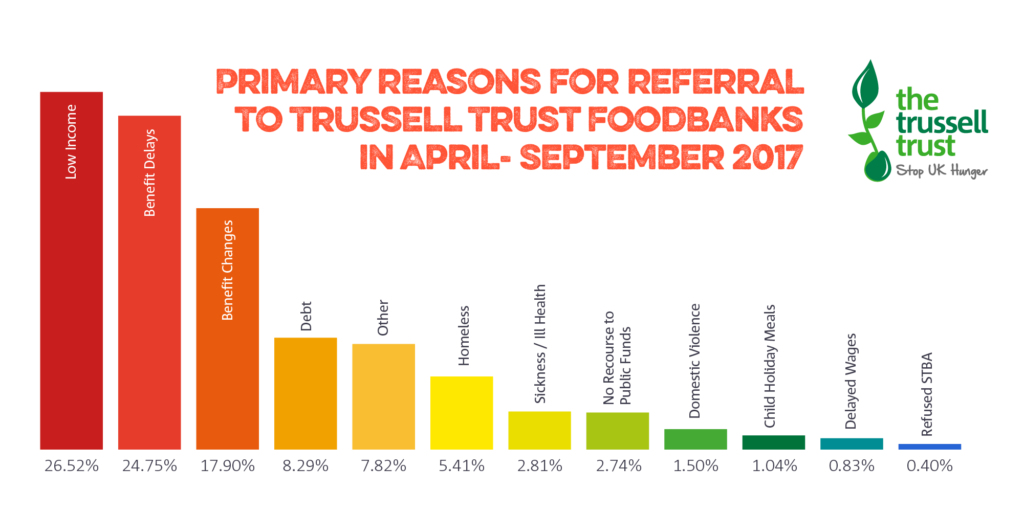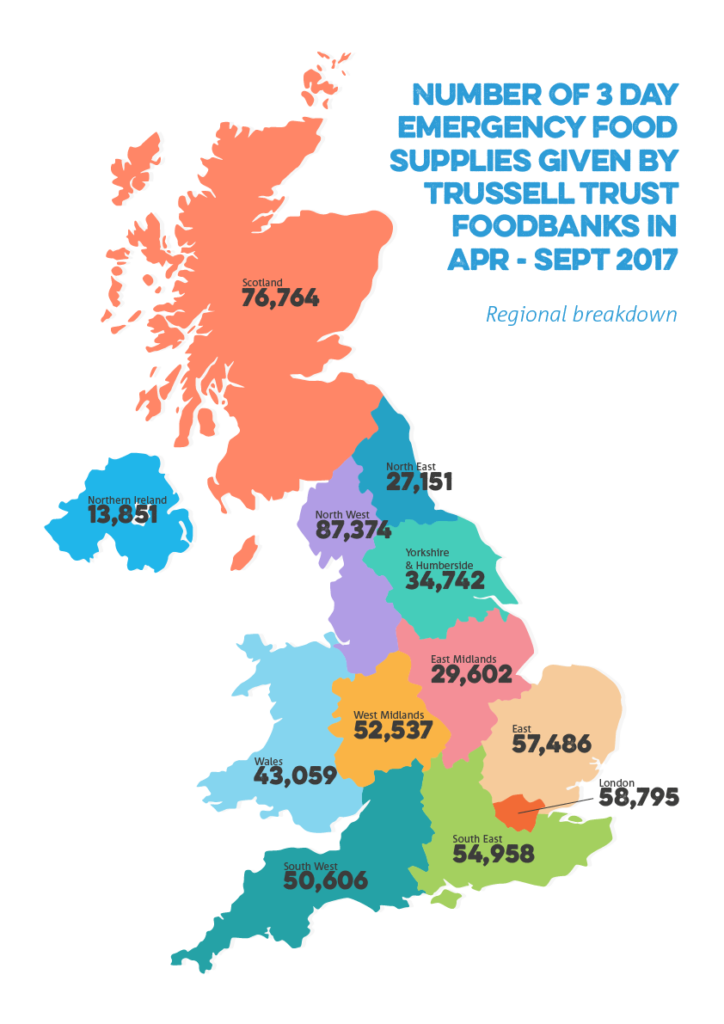- 586,907 three day emergency food supplies given to people in crisis in first half of this year, a 13% increase on the same period last year – 208,956 to children
- Foodbanks in areas of full Universal Credit rollout for six months or more have seen a 30% average increase six months after rollout compared to a year before
- Foodbanks report serious effects of six-plus week waiting period, poor administration and inability of current advance payment system to support everyone on no income
- The Trussell Trust unveils five point plan for decision-makers and calls on public for donations to stop people going hungry this Christmas
Between 1st April and 30th September 2017, The Trussell Trust’s foodbank network distributed 586,907 three day emergency food supplies to people in crisis compared to 519,342 during the same period last year, 208,956 of these went to children. This is a measure of volume rather than unique users, and on average people needed around two foodbank referrals in the last year.* [see notes to editor] The figure, distributed before full Universal Credit rollout accelerated in October 2017, means the foodbank network is already on course to distribute a new record number of food parcels in 2017-18.
The charity is concerned the situation will worsen in the months leading to Christmas when demand for food traditionally spikes, and when the number of foodbanks in areas of full Universal Credit service will triple. New analysis of Trussell Trust foodbanks in areas of full Universal Credit rollout shows that foodbanks in areas of full rollout for six months or more have seen a 30% average increase six months after rollout compared to a year before. Comparative analysis of foodbanks not in full Universal Credit rollout areas showed an average increase of 12%.**
Trussell Trust data reveals that issues with a benefit payment remain the biggest cause of referral to a foodbank across the UK, accounting for 43 percent of all referrals (25 percent benefit delay; 18 percent benefit change). New analysis of foodbank data*** also shows that:
- Of people referred due to a benefit delay, 45% of referrals made due to a wait for a first payment were related to Universal Credit and 36% of referrals made because a new claim had not yet been awarded were related to Universal Credit.
- Of people referred due to a benefit change, 38% of referrals made due to a change to a different benefit were related to Universal Credit.
Low income, which refers to anyone in work or on benefits struggling to get by on their income, accounts for 27 percent of referrals – suggesting certain pay and benefit levels are not protecting people from falling into crisis.
Foodbanks are responding to the impact of Universal Credit in a variety of ways but many are reporting extra pressure on food donation stocks, and several have highlighted concerns about volunteers’ time and emotional welfare. Foodbank managers across the UK identify three main obstacles to meeting future need: longer term issues requiring higher than average number of foodbank referrals; overwhelming numbers of people needing help; and food donations not meeting need.
To help prevent people facing hunger at Christmas, The Trussell Trust is asking policy-makers to urgently take action on:
- Six-week wait: As a matter of urgency, the 6 week wait for the first payment must be cut to make sure people aren’t left without money and in need of a foodbank. To start with, the two waiting periods, a week at the start of a claim and a week after a month’s assessment period, should be reduced.
- Advance loan repayment: there must be better availability of advance loans which are affordable to repay and do not throw people back into crisis. A three month grace period before starting repayments should be made available, as well as information about paying back smaller proportions of an advance loan so people can agree an appropriate repayment plan.
- Poor administration: 1/5 of people are waiting for longer than 6 weeks***; documents are being lost; people are being overpaid or underpaid; and finding themselves in debt or rent arrears. These issues should be assessed and tackled across rollout areas.
- Transition between legacy benefits and Universal Credit: when someone moves onto Universal Credit, any benefit previously paid automatically stops. All benefit payments should run on until Universal Credit payments start, with a focus on Housing Benefit.
- Benefit level freeze: although Universal Credit rollout is a key concern, foodbank referral data and University of Oxford research suggest benefit levels more widely are not preventing people from reaching crisis point. Ahead of the Budget, the Government should reassess its current four-year freeze on benefit levels.
Mark Ward, Interim Chief Executive at The Trussell Trust, said:
“We’re seeing soaring demand at foodbanks across the UK. Our network is working hard to stop people going hungry but the simple truth is that even with the enormous generosity of our donors and volunteers, we’re concerned foodbanks could struggle to meet demand this winter if critical changes to benefit delivery aren’t made now. People cannot be left for weeks without any income, and when that income does come, it must keep pace with living costs – foodbanks cannot be relied upon to pick up the pieces.
“Our five point plan isn’t going to fix everything – but these emergency measures would help mitigate some of the damage we’re worried will otherwise take place. Without urgent action from policy-makers and even more generous practical support from the public, we don’t know how foodbanks are going to stop families and children going hungry this Christmas.”
The Trussell Trust is therefore calling for help from the public to make sure people in crisis get the support needed. To find information on what items of stock are most needed at individual foodbanks, find their website via https://www.trusselltrust.org/get-help/find-a-foodbank/ and click on the links to “Give help”/”Donate food”.
ENDS
Notes to Editor:
Contact:
Please contact The Trussell Trust media team on 020 3137 3699 / [email protected]. Out of hours call 07789 642 727.
The Trussell Trust:
- The Trussell Trust is an anti-poverty charity that runs a network of 428 foodbanks across the UK.
- Trussell Trust foodbanks provide three days’ nutritionally balanced food and support to people in crisis in the UK, and many foodbanks offer free additional services, like money advice and budget cookery courses as part of the charity’s ‘More Than Food’ approach, to build resilience and help prevent people needing referral to a foodbank again. Foodbank volunteers are also trained to signpost people to other agencies and services able to help resolve the underlying cause of the crisis.
- Everyone who comes to a Trussell Trust foodbank is referred by a professional such as a social worker, health visitor or schools liaison officer. Over 40,000 frontline professionals refer people to Trussell Trust foodbanks, and 50 percent are statutory agencies.
- Over 90 percent of food given out by Trussell Trust foodbanks is donated by the public. In April to September 2017, 4,709 tonnes of food were donated.
- The Trussell Trust is a charity motivated by Christian principles. For more on The Trussell Trust visit trusselltrust.org
Trussell Trust foodbank statistics:
**New analysis of Trussell Trust foodbanks in areas of full Universal Credit rollout shows that foodbanks in areas of full rollout for six months or more have seen a 30% average increase six months after rollout compared to a year before. This has been calculated by summing individual foodbank data for the six months before and after Universal Credit full service went ‘live’ in their area, and calculating the percentage increase between the start and end points of the ‘best fit’ trend line.
Comparative analysis of 260 other foodbanks that are not in full Universal Credit rollout areas over the showed an average increase of 12%. This has been calculated by assigning each foodbank a ‘go live’ month at random, and, for those foodbanks with more than 6 months since their an assigned “go live” date, summing individual data for the six months before and after that ‘go live’ month, and calculating the percentage increase between the start and end points of the ‘best fit’ trend line.
*Trussell Trust statistics are collected using an online data collection system into which foodbanks enter the data from each foodbank voucher. The system records numbers given three day emergency food supplies. The Trussell Trust is measuring volume – the number of people to whom it has given three days’ food supply (containing enough food for 10 meals). The Trussell Trust has consistently measured figures in this way and reports them at the middle and end of each financial year. Trussell Trust figures clearly state that we are counting the number of people to whom three days’ food has been given, but these are not necessarily unique people. Our data system can calculate the average visit frequency within a time period and shows people visited on average around two times in the 12 months to September 2017, leading us to estimate that approximately 293,451 people are likely to have been unique users in April – September of this year.
- Trussell Trust data collection seeks to comply with ONS guidance. The Trussell Trust receives technical advice from a former senior government statistician, and has consulted with a range of statisticians ahead of publication.
- ‘Benefit delays’ refer to people not receiving benefits to which they are entitled on time, this category can also include problems with processing new claims, or any other time-lags in people receiving their welfare payments.
- ‘Benefit changes’ refers to the problems resulting from a change in people’s welfare payments, for example, people having their benefits stopped whilst they are reassessed. This can also include a sanction.
- ‘Low income’ refers to anyone who is struggling to get by on a low income. This could be people in work, or people on benefits, for whom a small crisis e.g. boiler breaking down or having to buy school uniform etc, can be enough to mean that they cannot afford food.
*** The Trussell Trust’s data collection system now allows for referral agencies to provide further information on why someone has been referred. 17% of vouchers between April and September 2017 included this secondary level of information on the reason for foodbank referral:
| Referral reason – primary reason and secondary data | Related to Universal Credit | Related to Job Seekers Allowance | Related to Employment Support Allowance | Additional benefit types |
| Benefit change: sanction | 27% | 29% | 31% | |
| Benefit change: change to a different benefit | 38% | 19% | 25% | |
| Benefit change: reduction of benefit value | 17% | 10% | 31% |
12% child tax credits 10% Personal Independence Payments |
| Benefit delay: new claim not yet awarded | 36% | 23% | 25% | |
| Benefit delay: awaiting new payment | 45% | 20% | 22% | |
| Benefit delay: interrupted payments | 18% | 17% | 40% |
Trussell Trust figures cannot be used to fully explain the scale of the food poverty across the UK, because our figures only relate to Trussell Trust foodbanks and not to the hundreds of other independent food aid providers. Mapping by The Independent Food Aid Network (IFAN) suggests that Trussell Trust foodbank centres account for roughly two-thirds of all emergency food aid provision in the UK: you can read more about this here.
*** Statistics from the Department for Work and Pensions: https://www.gov.uk/government/news/universal-credit-payments-and-labour-market-reports-published





